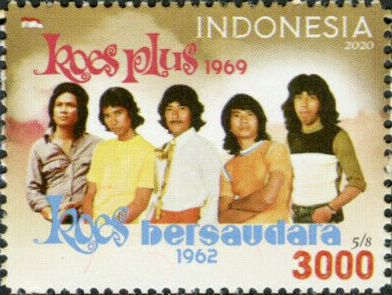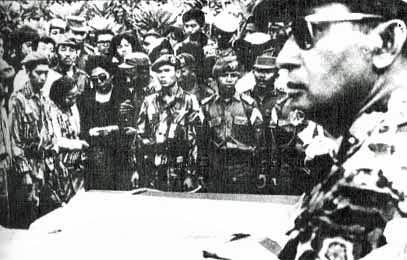|
Dara Puspita
Dara Puspita were an all-female pop group from Surabaya, Indonesia active in the 1960s and early 1970s. The band consisted of Titiek Adji Rachman (lead guitar), Susy Nander (drums), Lies Adji Rachman (rhythm guitar) and Titiek Hamzah (bass). The band was formed in 1964, with Titiek Rachman (born 1946) and her younger sister Lies (born 1948) on bass. In addition, Ani Kusuma was the rhythm guitarist, and Susy Nander played drums. The Rachman sisters were two of 10 children of Adjie Rachman, formerly a kroncong musician. When Lies left the band for a month in 1965 to finish her education, she was replaced on bass by Titiek Hamzah (born 1949). When Lies returned, Ani Kusuma left the band, and Lies became the rhythm guitarist. The band faced pressure from the Sukarno regime, which saw rock music as an unwanted Western influence, going so far as to imprison the popular band Koes Bersaudara, and the band sought a safer place to play, performing live in Bangkok, and picking up some Thai in ... [...More Info...] [...Related Items...] OR: [Wikipedia] [Google] [Baidu] |
Surabaya
Surabaya ( jv, ꦱꦸꦫꦧꦪ or jv, ꦯꦹꦫꦨꦪ; ; ) is the capital city of the Provinces of Indonesia, Indonesian province of East Java and the List of Indonesian cities by population, second-largest city in Indonesia, after Jakarta. Located on the northeastern border of Java island, on the Madura Strait, it is one of the earliest port cities in Southeast Asia. According to the Government of Indonesia, National Development Planning Agency, Surabaya is one of the Regions of Indonesia#Development regions, four main central cities of Indonesia, alongside Jakarta, Medan, and Makassar. The city has a population of 2.87 million within its city limits at the 2020 census and 9.5 million in the extended Surabaya metropolitan area, making it the List of metropolitan areas in Indonesia, second-largest metropolitan area in Indonesia. The city was settled in the 10th century by the Janggala, Kingdom of Janggala, one of the two Javanese kingdoms that was formed in 1045 when ... [...More Info...] [...Related Items...] OR: [Wikipedia] [Google] [Baidu] |
Kroncong
Kroncong (pronounced "kronchong"; id, Keroncong, nl, Krontjong) is the name of a ukulele-like instrument and an Indonesian musical style that typically makes use of the kroncong (the sound ' comes from this instrument, so the music is called ''kroncong''). A ''kroncong'' orchestra or ensemble traditionally consists of a flute, a violin, at least one, but usually a pair of ''kroncongs'', a cello in pizzicato style, string bass in pizzicato style, and a vocalist. ''Kroncong'' originated as an adaptation of a Portuguese musical tradition, brought by sailors to Indonesian port cities in the 16th century. By the late 19th century, ''kroncong'' reached popular music status throughout the Indonesian archipelago. Characteristics The name "Kroncong" may be derived from the jingling sound of the ''kerincing rebana'', as heard in the rhythmic background of the music created by the interlocking of instruments playing on or off beat. This background rhythm runs faster than the often slow vo ... [...More Info...] [...Related Items...] OR: [Wikipedia] [Google] [Baidu] |
Sukarno
Sukarno). (; born Koesno Sosrodihardjo, ; 6 June 1901 – 21 June 1970) was an Indonesian statesman, orator, revolutionary, and nationalist who was the first president of Indonesia, serving from 1945 to 1967. Sukarno was the leader of the Indonesian struggle for independence from the Dutch colonialists. He was a prominent leader of Indonesia's nationalist movement during the colonial period and spent over a decade under Dutch detention until released by the invading Japanese forces in World War II. Sukarno and his fellow nationalists collaborated to garner support for the Japanese war effort from the population, in exchange for Japanese aid in spreading nationalist ideas. Upon Japanese surrender, Sukarno and Mohammad Hatta declared Indonesian independence on 17 August 1945, and Sukarno was appointed president. He led the Indonesian resistance to Dutch re-colonisation efforts via diplomatic and military means until the Dutch recognition of Indonesian independence ... [...More Info...] [...Related Items...] OR: [Wikipedia] [Google] [Baidu] |
Koes Bersaudara
Koes Plus, formerly Koes Bersaudara (Koes Brothers), is an Indonesian musical group that enjoyed success in the 1960s and 1970s. Known as one of Indonesia's classic musical acts, the band peaked in popularity in the days far before the advent of private television companies, delivering stripped-down pop and rock songs at the then-only TV station, TVRI. In 2007, ''Rolling Stone Indonesia'' magazine placed 6 of the band's studio albums on their 150 Greatest Indonesian Albums of All Time list. Those are '' Dheg Dheg Plas'' (1969) at number 4, '' To The So Called The Guilties'' (1967) at number 6, ''Koes Bersaudara'' (1964) at number 14, '' Koes Plus Volume 2'' (1970) at number 21, '' Koes Plus Volume 4'' (1971) at number 30 and '' Koes Plus Volume 5'' (1971) at number 38. In addition, ''Rolling Stone'' put 10 of the band's songs on the 150 Greatest Indonesian Songs of All Time list. The songs are "Bis Sekolah" (1964) at number 4, "Kembali Ke Jakarta" (1969) at number 6, "Nusantara ... [...More Info...] [...Related Items...] OR: [Wikipedia] [Google] [Baidu] |
Transition To The New Order
Indonesia's transition to the New Order in the mid-1960s ousted the country's first president, Sukarno, after 22 years in the position. One of the most tumultuous periods in the country's modern history, it was the commencement of Suharto's 31-year presidency. Described as the great ''dhalang'' ("puppet master"), Sukarno drew power from balancing the opposing and increasingly antagonistic forces of the army and Indonesian Communist Party (PKI). By 1965, the PKI extensively penetrated all levels of government and gained influence at the expense of the army. On 30 September 1965, six of the military's most senior officers were killed in action (generally labelled an "attempted coup") by the so-called 30 September Movement, a group from within the armed forces. Within a few hours, Major General Suharto mobilised forces under his command and took control of Jakarta. Anti-communists, initially following the army's lead, went on a violent purge of communists throughout the coun ... [...More Info...] [...Related Items...] OR: [Wikipedia] [Google] [Baidu] |
Garage Rock
Garage rock (sometimes called garage punk or 60s punk) is a raw and energetic style of rock and roll that flourished in the mid-1960s, most notably in the United States and Canada, and has experienced a series of subsequent revivals. The style is characterized by basic chord (music), chord structures played on electric guitars and other instruments, sometimes distorted through a distortion (music), fuzzbox, as well as often unsophisticated and occasionally aggressive lyrics and delivery. Its name derives from the perception that groups were often made up of young amateurs who rehearsed in the family Garage (residential), garage, although many were professional. In the US and Canada, surf rock—and later the Beatles and other beat music, beat groups of the British Invasion—motivated thousands of young people to form bands between 1963 and 1968. Hundreds of acts produced regional hits, and some had national hits, usually played on AM radio stations. With the advent of psyc ... [...More Info...] [...Related Items...] OR: [Wikipedia] [Google] [Baidu] |
Sublime Frequencies
Sublime Frequencies is a record label based in Seattle, Washington that focuses exclusively on "acquiring and exposing obscure sights and sounds from modern and traditional urban and rural frontiers," mostly from Southeast Asia, North Africa and West Africa and the Middle East. The releases are usually divided into four categories: field recordings, folk and pop compilations, radio collages from specific geographic locales, and DVDs. The label is headed by Alan Bishop and Hisham Mayet. Its releases are produced in limited quantities, usually up to a thousand copies. Its mission statement is: Sublime Frequencies is a collective of explorers dedicated to acquiring and exposing obscure sights and sounds from modern and traditional urban and rural frontiers via film and video, field recordings, radio and short wave transmissions, international folk and pop music, sound anomalies, and other forms of human and natural expression not documented sufficiently through all channels of acade ... [...More Info...] [...Related Items...] OR: [Wikipedia] [Google] [Baidu] |
Indonesian Garage Rock Groups
Indonesian is anything of, from, or related to Indonesia, an archipelagic country in Southeast Asia. It may refer to: * Indonesians, citizens of Indonesia ** Native Indonesians, diverse groups of local inhabitants of the archipelago ** Indonesian women, overview of women's history and contemporary situations * Indonesian language (Indonesian: ''Bahasa Indonesia''), the official language of Indonesia ** Indonesian languages, overview of some of the 700 languages spoken in Indonesia ** Indonesian names, customs reflecting the multicultural and polyglot nature of Indonesia * Indonesian culture, a complex of indigenous customs and foreign influences ** Indonesian art, various artistic expressions and artworks in the archipelago ** Indonesian cinema, a struggling and developing industry ** Indonesian literature, literature from Indonesia and Southeast Asia with shared language roots ** Indonesian music, hundreds of forms of traditional and contemporary music ** Indonesian philosophy, ... [...More Info...] [...Related Items...] OR: [Wikipedia] [Google] [Baidu] |
All-female Bands
An all-female band is a musical group in popular music that is exclusively composed of female musicians. This is distinct from a girl group, in which the female members are solely vocalists, though this terminology is not universally followed. While all-male bands are common in many rock and pop scenes, all-female bands are less common. 1920s–1950s In the Jazz Age and during the 1930s, "all-girl" bands such as the Blue Belles, the Parisian Redheads (later the Bricktops), Lil-Hardin's All-Girl Band, the Ingenues, the Harlem Playgirls led by the likes of Neliska Ann Briscoe and Eddie Crump, the International Sweethearts of Rhythm, Phil Spitalny's Musical Sweethearts, "Helen Lewis and Her All-Girl Jazz Syncopators" as well as "Helen Lewis and her Rhythm Queens were popular. Dozens of early sound films were made of the vaudeville style all-girl groups, especially short subject promotional films for Paramount and Vitaphone. (In 1925, Lee de Forest filmed Lewis and her band in his sho ... [...More Info...] [...Related Items...] OR: [Wikipedia] [Google] [Baidu] |


